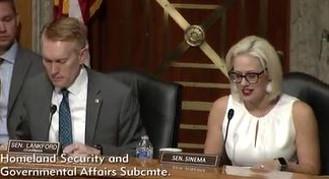Comment on FinCEN's Anti-Money Laundering Regulations for Residential Real Estate Transfers
Public interest comment by RSC Policy Analyst Sarah Hay

Scholarly analysis of the potential effects of particular rulemakings from federal agencies, and advice to Congress on how to improve the rulemaking process by GW Regulatory Studies Center scholars.

"Your input and expertise during the drafting of the Early Participation in Regulations Act of 2019 and SMART Act of 2019 was invaluable."
Senator Kyrsten Sinema (D-AZ)
Senator James Lankford (R-OK)
Joint statement
Comment on FinCEN's Anti-Money Laundering Regulations for Residential Real Estate Transfers
Public interest comment by RSC Policy Analyst Sarah Hay
On the FTC's Trade Regulation on Unfair or Deceptive Fees Proposed Rule
More research is needed to understand which types of "junk fees" warrant regulating
Comment on FTC-DOJ Draft Merger Guidelines
The proper goal of merger enforcement policy is to prevent only those mergers that seem likely to reduce the welfare of consumers
Letter to OIRA Administrator on Circular A4
Former SBCA presidents emphasize the importance of best practices for discounting and distributional impacts for making the new OMB Circular a durable guide
Draft Circular A4 Peer Review Comments: Joseph Cordes
As a peer reviewer selected by Office of Management and Budget, Joseph Cordes evaluated Draft Circular A-4: Guidance on regulatory analysis
Insight by Brian Mannix submitted as a public interest comment to OMB in response to Draft Circular A-4
Using Distributional Weights in Circular A-4 Would Encourage Wasteful Rent-Seeking
Public interest comment by Visiting Scholar Brian Mannix argues for benefit-cost analysis as a check on administrative discretion
Simpler, More Transparent Analysis Will Make Circular A-4 More Valuable to the Regulatory Process
Public interest comment filed jointly by GW's Christopher Carrigan and Stuart Shapiro of Rutgers University
Public interest comment on the OMB Draft Circular A-4 by Susan Dudley, former Administrator of the Office of Information and Regulatory Affairs
On Draft Circular A4, Behavioral Biases, and Discount Rates
Public Interest Comment on the Office of Management and Budget's Draft Circular A4 concerning benefit-cost analysis
